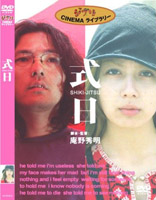Shiki-Jitsu
| Shiki-Jitsu | |
|---|---|
 | |
| Directed by | Hideaki Anno |
| Screenplay by | Hideaki Anno |
| Based on | Tōhimu by Ayako Fujitani |
| Produced by | |
| Starring |
|
| Cinematography | |
| Edited by | |
| Music by | Takashi Kako |
Production company | |
| Distributed by | Tokuma Shoten |
Release date | 7 December 2000 |
Running time | 128 minutes |
| Country | Japan |
| Language | Japanese |
Shiki-Jitsu (式日, Shikijitsu, lit. "ritual day" or "ceremonial day", also known as Ritual) is a 2000 art film[1] directed by Hideaki Anno.[2] The film is Anno's second live-action feature.[3]
The screenplay is an adaption by Anno of Ayako Fujitani's novella ,[2] which was inspired by an emotionally difficult time spent in Los Angeles during her work in her father's 1998 film, The Patriot.[citation needed] Michael Ordona of the Los Angeles Times reported the film had "dark themes of mental illness and suicidal ideation".[1]
The film tells the story of a director, played by independent filmmaker Shunji Iwai, who meets an odd young woman, played by Ayako Fujitani, who wrote the novella Tōhimu the film is based upon. The story takes place over a period of 33 days. The plot involves these two characters trying to work their way out of a collective emotional funk.[3]
Shiki-Jitsu won an award for Best Artistic Contribution at the 13th International Film Festival in Tokyo.[4]
Story[]
The film follows a young Director returning to his hometown, a suburb of a larger Japanese city, and an eccentric young girl he meets, whose quirks include saying "tomorrow is my birthday" every day and wearing very unusual clothing.
But as the days go by, it appears that the woman has little touch with reality and is constantly escaping into a fantasy world, while the Director himself is a former anime director who is seeking to do a "real film" and embrace reality. The two eventually fall in love.
In the end, the Director confronts the Woman with her mother, allowing the Woman to make the first steps into the real world. The films ends with the Girl circling December 7 as her real birthday and the words "beyond the 33rd day: unknown".
Release[]
The film was produced by Studio Kajino, an offshoot of Studio Ghibli, run by its former president Toshio Suzuki who served on the film as executive producer. It was given a première at the Tokyo Photography Museum in Ebisu Garden Place on December 7, 2000.
The movie was later released on VHS and DVD by Buena Vista Home Entertainment Japan July 24, 2003 as part of the "Ghibli Cinematic Library" series.[5] On July 1, 2020, the movie was released to Video on demand by King Records.
References[]
- ^ Jump up to: a b Ordona, Michael (March 19, 2009), "Ayako Fujitani", Los Angeles Times, retrieved 2013-02-19.
- ^ Jump up to: a b Baskin, Ellen (2003), Enser's Filmed Books and Plays: A List of Books and Plays from Which Films Have Been Made, 1928-2001 (6th ed.), Ashgate Publishing, Ltd., p. 378, ISBN 978-0754608783.
- ^ Jump up to: a b Mark Deming (2014). "Shiki-jitsu (2001)". Movies & TV Dept. The New York Times. Archived from the original on 13 March 2014. Retrieved 27 February 2014.
- ^ Short, Stephen (May 13, 2002), "Why the Hell Not?", Time Magazine, archived from the original on December 1, 2008, retrieved 2013-02-19.
- ^ http://www.ghibli.jp/info/000140/
External links[]
- Japanese-language films
- Japanese films
- 2000 films
- Films directed by Hideaki Anno
